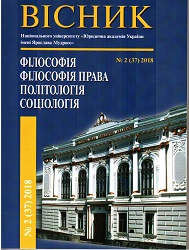ГЕНЕЗА І ФУНКЦІОНАЛЬНІ ОСОБЛИВОСТІ ПОЛІТИЧНИХ ПАРТІЙ
GENESIS AND FUNCTIONAL FEATURES OF POLITICAL PARTIES
Author(s): Galina Pavlovna KlimovaSubject(s): Electoral systems
Published by: Національний юридичний університет імені Ярослава Мудрого
Keywords: political party; political institutions; multi-party system; party regeneration; functions of political parties;
Summary/Abstract: Problem setting. In societies with diverse structured interests, there is a need for stable communication channels between civil society and government institutions. These channels are formed through the activities of pressure groups, lobbyists, and especially political parties. Recent research and publications analysis. The scientific literature discusses widely the problems of political parties. They are at the center of attention of well-known scholars (L. I. Adachis, O. Yu. Boyko, L. M. Dunaev, J.-F. Dupre, B. Farrer, A. Gauja, J. Green, K. Jacobs, R. Jahan, W. Jennings, B. A. Isaev, R. Madinier, N. Miragliotta, A. I. Pashuk, M. V. Primush, O. I. Semkiv, V. M. Skrypinyuk, R. Smith, N. Spierings, O. S. Statsenko, G. M. Svita, etc.). Paper objective. The article analyzes the essence ofa political party in a philosophical, legal and political context. The article aims to provide a theoretical and methodological analysis of the concept of «political party», to consider the historical conditions and mechanism of the emergence and development of political parties, to analyze their functional system. Paper main body. What is a political party in the modern sense? Lawyers believe that «a political party is an active and organized part of a society that is united by common interests, goals or ideals and tries to seize state power or significantly influence its implementation». Philosophers see in political parties «the main organizational forms of the associative political life of society, which represent interests, views, cultural accounting, the social situation of various layers and social groups of the social whole». Often, political scientists find out the party as a «specialized, organizationally organized group that combines the most active adherents of those or other purposes (ideologies, leaders) and serves to fight for the seizure and use of political power». For this, the party must become a ruling, that is, to take a position in the political system that enables to determine the policy of the state. In the scientific literature, the first regeneration of parties is usually called «created from the inside». This means that they were formed within the parliament by factions formed on the basis of common interests. The classic examples of such formations are the conservative parties of Scandinavia and Great Britain. Historically, such parties performed the representation of traditional elites - the court nobility, the aristocracy. Initially created on an informal basis, they felt the need to expand the electoral base when the transition to universal suffrage began to take place. This was implemented, and in the period from 1900 to 1990, the Conservative Party of Great Britain, for example, ruled the country (either one or coalition) altogether for 60 years. The second regeneration of parties is called «created from the outside». They arose due to the demands of parliamentary representation by those social groups, which were firstly excluded or insufficiently represented in parliament. The most striking example of this kind of parties is the workers’ and socialist parties, which were everywhere created on the verge of the XIX-XX centuries. Later, outside the walls of parliaments, communist and nationalist parties were created, which demanded no reforms, but the complete destruction of the socio-political system that existed. In our time, the «green» party, which is immensely popular among young people and well-educated people, also arises without the participation of parliaments. Functions of political parties - the essence of the main aspects or directions of their activities, which are determined by the goals and tasks that face them. Among these functions, the following are usually singled out: 1) the initial function of the party, which characterizes its connection with certain social strata and classes, is the function of representation of interests; 2) the central point of the activities of any political party - the development of a policy course aimed at solving problems existing in society; 3) the function of recruiting new members, educating activists, mobilizing voters in support of party candidates; in the literature it is indicated that political parties are, for the most part, objects of strong emotional attachment or rejection; 4) the function of the party’s participation in the formation and control of the activities of state authorities; parties serve as the main mechanism through which candidates for public office at all levels are trained and selected; 5) the presence of political parties, their participation in elections of state bodies allows peaceful resolution of social conflicts; 6) in the conditions of formation or strengthening of statehood, political parties often perform the function of national integration; 7) almost all aspects of the activities of any party permeate the ideological and educational function; 8) political parties realize the communicative function necessary for the democratic exercise of state power. Conclusions of the research. Political parties are one of the main institutions of the political system. As subjects of the formation of power relations, they largely determine the nature and direction of the political process, strategy and tactics of the struggle for power, political stability of society.
Journal: Вісник НЮУ імені Ярослава Мудрого. Серія: Філософія, філософія права, політологія, соціологія
- Issue Year: 37/2018
- Issue No: 2
- Page Range: 31-45
- Page Count: 15
- Language: Ukrainian

